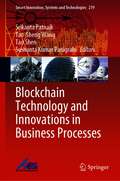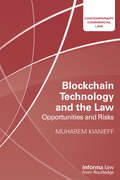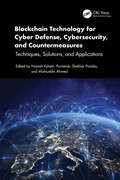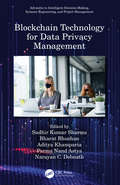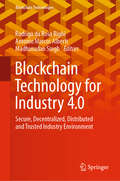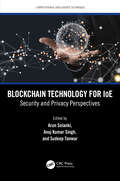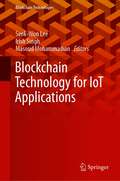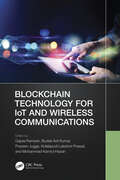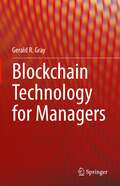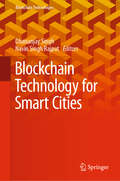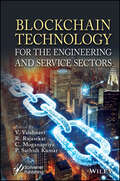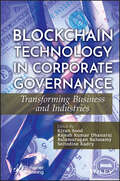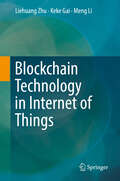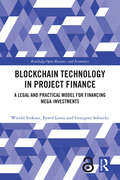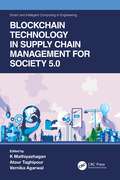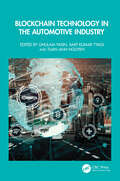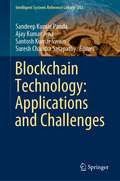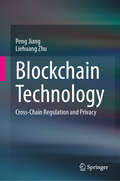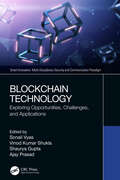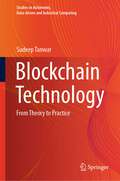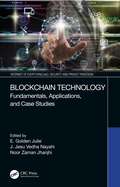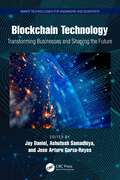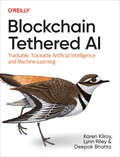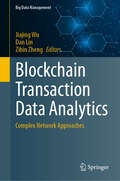- Table View
- List View
Blockchain Technology and Innovations in Business Processes (Smart Innovation, Systems and Technologies #219)
by Srikanta Patnaik Tao-Sheng Wang Tao Shen Sushanta Kumar PanigrahiThis edited book provides a platform to bring together researchers, academia and industry collaborators to exchange their knowledge and work to develop better understanding about the scope of blockchain technology in business management applications of different sectors such as retail sector, supply chain and logistics, healthcare sector, manufacturing sector, judiciary, finance and government sector in terms of data quality and timeliness. The book presents original unpublished research papers on blockchain technology and business management on novel architectures, prototypes and case studies.
Blockchain Technology and the Law: Opportunities and Risks (Contemporary Commercial Law)
by Muharem KianieffBlockchain Technology and the Law: Opportunities and Risks is one of the first texts to offer a critical analysis of Blockchain and the legal and economic challenges faced by this new technology. This book will offer those who are unfamiliar with Blockchain an introduction as to how the technology works and will demonstrate how a legal framework that governs it can be used to ensure that it can be successfully deployed. Discussions included in this book: - an introduction to smart contracts, and their potential, from a commercial and consumer law perspective, to change the nature of transactions between parties; - the impact that Blockchain has already had on financial services, and the possible consumer risks and macro-economic issues that may arise in the future; - the challenges that are facing global securities regulators with the development of Initial Coin Offerings and the ongoing risks that they pose to the investing public; - the risk of significant privacy breaches due to the online public nature of Blockchain; and - the future of Blockchain technology. Of interest to academics, policy-makers, technology developers and legal practitioners, this book will provide a thorough examination of Blockchain technology in relation to the law from a comparative perspective with a focus on the United Kingdom, Canada and the United States.
Blockchain Technology for Cyber Defense, Cybersecurity, and Countermeasures: Techniques, Solutions, and Applications
by Mohiuddin Ahmed Naresh Kshetri Purnendu Shekhar PandeyThe rapid increase in IT infrastructure and presence in cyber space has given rise to enormous chances of security breach. Cybersecurity is one of the burning issues in today’s modern world and the lack of cybersecurity policy and cyber strategy might make the situation vulnerable. Today blockchain technology has almost covered every sector from business to data security. This book is written for all enthusiastic and cyber professionals in this new era of blockchain technology. Blockchain has already proved its versatile nature as adopted by several governments and tech giants from all over the world. Any anonymous user can trust another anonymous user in the cyber world with the authentication and validation via blockchain technology.Blockchain governance provides a more distributed diffusion of authority in which authentication sources are the individual themselves. This book offers approaches for cybersecurity and cyber defense via blockchain technology to counter cyber-attacks and ransomwares that are increasing every second. The book can be used in many ways by several cybersecurity professionals to secure online data, people, and networks as a part of cybersecurity, information security and cyber defense initiative with several countermeasures and defense strategies in the web. Each chapter of the book provide excellent tools and techniques for the burning and challenging issues in today’s modern cyber (and zero trust) world.
Blockchain Technology for Data Privacy Management (Advances in Intelligent Decision-Making, Systems Engineering, and Project Management)
by Bharat Bhushan Narayan C. Debnath Sudhir Kumar Sharma Aditya Khamparia Parma Nand AstyaThe book aims to showcase the basics of both IoT and Blockchain for beginners as well as their integration and challenge discussions for existing practitioner. It aims to develop understanding of the role of blockchain in fostering security. The objective of this book is to initiate conversations among technologists, engineers, scientists, and clinicians to synergize their efforts in producing low-cost, high-performance, highly efficient, deployable IoT systems. It presents a stepwise discussion, exhaustive literature survey, rigorous experimental analysis and discussions to demonstrate the usage of blockchain technology for securing communications. The book evaluates, investigate, analyze and outline a set of security challenges that needs to be addressed in the near future. The book is designed to be the first reference choice at research and development centers, academic institutions, university libraries and any institutions interested in exploring blockchain. UG/PG students, PhD Scholars of this fields, industry technologists, young entrepreneurs and researchers working in the field of blockchain technology are the primary audience of this book.
Blockchain Technology for Industry 4.0: Secure, Decentralized, Distributed and Trusted Industry Environment (Blockchain Technologies)
by Madhusudan Singh Rodrigo da Rosa Righi Antonio Marcos AlbertiThis book explores recent advances in blockchain technology and its impact on Industry 4.0 via advanced technologies. It provides an in-depth analysis of the step by step evolution of Industry 4.0 and blockchain technologies for creating the next-generation, secure, decentralized, distributed and trusted industry environment and enhancing the productivity of industries. The book describes how blockchain technology makes the industrial internet (Industry 4.0) a transparent, reliable and secure environment for people, processes, systems, and services, presenting a strong, technological and conceptual framework and roadmap for decision-makers involved in the transformation of any area of industry.
Blockchain Technology for IoE: Security and Privacy Perspectives (Computational Intelligence Techniques)
by Sudeep Tanwar Arun Solanki Anuj Kumar SinghThis book explores opportunities and challenges in the field of Internet of Everything (IoE) security and privacy under the umbrella of distributed ledger technologies and blockchain technology including distributed consensus mechanisms, crypto-sensors, encryption algorithms, and fault tolerance mechanisms for devices and systems. It focusses on the applicability of blockchain technology, including architectures and platforms for blockchain and IoE, authentication and encryption algorithms for IoE, malicious transactions detection, blockchain for forensics, and so forth. Outlines the major benefits as well as challenges associated with integration of blockchain with IoE; Describes detailed framework to provide security in IoE using blockchain technology; Reviews various issues while using distributed ledger technologies for IoE; Provides comprehensive coverage of blockchain for IoE in securing information including encryption schemes, authentication, security issues, and challenges; Includes case studies in realistic situations like healthcare informatics, smart industry, and smart transportation. This book is aimed at researchers and graduate students in computing, cryptography, IoT, computer engineering, and networks.
Blockchain Technology for IoT Applications (Blockchain Technologies)
by Seok-Won Lee Masoud Mohammadian Irish SinghThis book explores recent advances in the Internet of things (IoT) via advanced technologies and provides an overview of most aspects which are relevant for advance secure, distributed, decentralized blockchain technology in the Internet of things, their applications, and industry IoT. The book provides an in-depth analysis of the step-by-step evolution of IoT to create a change by enhancing the productivity of industries. It introduces how connected things, data, and their communication (data sharing) environment build a transparent, reliable, secure environment for people, processes, systems, and services with the help of blockchain technology.
Blockchain Technology for IoT and Wireless Communications
by Budati Anil Kumar Gajula Ramesh Praveen Jugge Kolalapudi Lakshmi Prasad Mohammad Kamrul HasanSmart communications are the concept in which smart appliances and devices are integrated into an application that runs in a smart hand-held device. The residents of a smart home can have complete control over their home’s electronic gadgets using wireless communications. These technologies can help people control gadgets in the home/office remotely and often simultaneously, which increases convenience and reduces time spent on these tasks. However, problems can arise in the security systems associated with these smart devices; security may be compromised when there are loopholes or human mistakes. When security credentials are lost, overall security can also be lost. This is because smart technology is made up of plenty of devices that are integrated with Internet of Things (IoT) technology and the cloud. This environment can introduce many security issues, as discussed in this text. Blockchain is a promising technology that operates in a decentralized environment to protect devices and the data collected by devices from security and privacy issues by using wireless communication technology. Blockchain-enabled IoT can be used to achieve end-to-end security. Blockchain technology is already used in wireless sensor/communication networks to estimate and predict house data and civil structures. IoT-integrated innovative applications like smart homes present unique security and privacy challenges. Scalability is the main problem as the current centralized IoT platforms have message routing mechanisms that create a bottleneck in scaling up too many devices used in IoT. As many devices are participating in generating data, such a setup may also be subjected to Distributed Denial of Service (DDoS) attacks. Lack of data standards is another cause of concern as it leads to interoperability problems. Blockchain technology for IoT and wireless communications offers a promising solution for smart devices. These technologies can provide end-to-end security and overcome the aforementioned problems. The usage of open-standard distributed IoT solutions can solve many problems that are associated with centralized approaches. Blockchain technology is nothing but a distributed ledger of transactions. It offers direct communication to connected devices. Such devices collect data, and all legitimate participants can access said data. Thus, decentralized blockchain networks can provide improved security for IoT-based solutions.
Blockchain Technology for Managers
by Gerald R. GrayBlockchain is a technology that tends to be misunderstood by managers that need to make technology acquisition decisions. This book will provide readers with a basic understanding of blockchain and distributed ledger technology (DLT), the technologies that underpin it, and the technologies DLT is built upon. The book is purposefully not a book on how to code or explore other technical aspects of blockchain (other than the fundamentals). Rather, it provides managers with the basic understanding of the architectures and consensus algorithms, how they work, the design trade-offs of each architecture type, and what problems and use cases the core characteristics of DLT are best suited to solve ─ providing business managers with the core information they need to ask the right questions of vendors when making business value assessments and acquisition decisions.
Blockchain Technology for Smart Cities (Blockchain Technologies)
by Dhananjay Singh Navin Singh RajputThis book provides a comprehensive overview of various aspects of the development of smart cities from a secure, trusted, and reliable data transmission perspective. It presents theoretical concepts and empirical studies, as well as examples of smart city programs and their capacity to create value for citizens. The contributions offer a panorama of the most important aspects of smart city evolution and implementation within various frameworks, such as healthcare, education, and transportation. Comparing current advanced applications and best practices, the book subsequently explores how smart environments and programs could help improve the quality of life in urban spaces and promote cultural and economic development.
Blockchain Technology for the Engineering and Service Sectors
by R. Rajasekar C. Moganapriya P. Sathish Kumar V. VaishnaviBlockchain Technology for the Engineering and Service Sectors is essential for anyone looking to understand how to harness blockchain technology, driving innovation and efficiency across various sectors Blockchain technology stands as one of the most transformative innovations of the 21st century, significantly impacting sectors including finance, manufacturing, and the service industry. Despite its relatively recent emergence, blockchain has the potential to revolutionize a wide array of industries, including tourism, agriculture, healthcare, and automobiles. With the growing interest in decentralized finance, governments and businesses are increasingly investing in research and development to enhance blockchain’s capabilities. As the technology continues to evolve, we can expect even more ground-breaking advancements in the near future. Blockchain Technology for the Engineering and Service Sectors is designed to provide a comprehensive exploration of blockchain technology, divided into two key areas of study. The first section delves into the history and technical evolution of blockchain, tracing its development from the inception of Bitcoin to its integration with other advanced technologies like the Internet of Things. The second section focuses on the frameworks and applications of blockchain, examining its use across various industries, including supply chain management, tourism, banking, healthcare, and automation. Additionally, the book addresses current challenges, emerging trends, and the future potential of blockchain technology. Through a detailed and structured presentation of these topics, readers will gain a deep understanding and expertise in the field of blockchain technology. Audience Researchers, engineers, and industry professionals working in research and development to explore the possibilities of blockchain.
Blockchain Technology in Corporate Governance: Transforming Business and Industries
by Seifedine Kadry Balamurugan Balusamy Rajesh Kumar Dhanaraj Kiran SoodBLOCKCHAIN TECHNOLOGY IN CORPORATE GOVERANCE This book investigates the recent applications of blockchain technology in financial services, energy sector, and summarizes regulatory responses, to set the scene for future work on corporate governance. This edited book highlights the current governance framework for the blockchain and its development as a self-governing framework. It discusses blockchain technology’s effectiveness in developing solutions for supply chains, trade finance, and banking. Moreover, it shows how banking and financial institutions are the major beneficiaries of this decentralized technology. Furthermore, the book outlines the link between company governance theories, regulatory, ethical, and social controls, and blockchain adoption. It also investigates the recent applications of blockchain technology in financial services, the health sector, and the energy sector. Audience The book is specially designed for researchers, industrialists, engineers, graduate students, and policymakers, who aspire to learn, discuss, and carry out further research into the opportunities offered by blockchain and the possible ways of regulating it.
Blockchain Technology in Healthcare Applications: Social, Economic, and Technological Implications (Advances in Smart Healthcare Technologies)
by Bharat BhushanTremendous growth in healthcare treatment techniques and methods has led to the emergence of numerous storage and communication problems and need for security among vendors and patients. This book brings together latest applications and state-of-the-art developments in healthcare sector using Blockchain technology. It explains how blockchain can enhance security, privacy, interoperability, and data accessibility including AI with blockchains, blockchains for medical imaging to supply chain management, and centralized management/clearing houses alongside DLT. Features: Includes theoretical concepts, empirical studies and detailed overview of various aspects related to development of healthcare applications from a reliable, trusted, and secure data transmission perspective. Provide insights on business applications of Blockchain, particularly in the healthcare sector. Explores how Blockchain can solve the transparency issues in the clinical research. Discusses AI with Blockchains, ranging from medical imaging to supply chain management. Reviews benchmark testing of AI with Blockchains and its impacts upon medical uses. This book aims at researchers and graduate students in healthcare information systems, computer and electrical engineering.
Blockchain Technology in Internet of Things
by Meng Li Liehuang Zhu Keke GaiThis book focuses on picturing B-IoT techniques from a few perspectives, which are architecture, key technologies, security and privacy, service models and framework, practical use cases and more. Main contents of this book derive from most updated technical achievements or breakthroughs in the field. A number of representative IoT service offerings will be covered by this book, such as vehicular networks, document sharing system, and telehealth. Both theoretical and practical contents will be involved in this book in order to assist readers to have a comprehensive and deep understanding the mechanism of using blockchain for powering up IoT systems. The blockchain-enabled Internet of Things (B-IoT) is deemed to be a novel technical alternative that provides network-based services with additional functionalities, benefits, and implementations in terms of decentralization, immutability, and auditability. Towards the enhanced secure and privacy-preserving Internet of Things (IoT), this book introduces a few significant aspects of B-IoT, which includes fundamental knowledge of both blockchain and IoT, state-of-the-art reviews of B-IoT applications, crucial components in the B-IoT system and the model design, and future development potentials and trends.IoT technologies and services, e.g. cloud data storage technologies and vehicular services, play important roles in wireless technology developments. On the other side, blockchain technologies are being adopted in a variety of academic societies and professional realms due to its promising characteristics. It is observable that the research and development on integrating these two technologies will provide critical thinking and solid references for contemporary and future network-relevant solutions. This book targets researchers and advanced level students in computer science, who are focused on cryptography, cloud computing and internet of things, as well as electrical engineering students and researchers focused on vehicular networks and more. Professionals working in these fields will also find this book to be a valuable resource.
Blockchain Technology in Project Finance: A Legal and Practical Model for Financing Mega-Investments (Routledge Open Business and Economics)
by Witold Srokosz Paweł Lenio Grzegorz SobieckiThere is currently no comprehensive scientific study that addresses the problem of financing projects using Distributed Ledger (blockchain) Technology (DLT) that are not themselves embedded in the blockchain ecosystem, particularly in the context of long-term and capital-intensive investments. This book fills this gap. It poses a number of research questions such as what financing model/mechanism is the most effective in the long term where very large financial resources are concerned; are there appropriate legal regulations in place; and can DLT (blockchain) technology provide usability and solutions that can be used in the process of financing capital-intensive investments?The book ultimately shows that it is possible to build a legal and economic model that would effectively enable the financing of long-term and capital-intensive investments, based on a specially prepared integrated platform operating on the basis of blockchain technology. As a result of the mechanisms of smart contracts, the platform would enable, the issuance and service of tokens, including equity tokens, but also auxiliary and payment or utility tokens, and the automation of relations between stakeholders. It would also allow the creation of a virtual decentralized autonomous organization (DAO) that would control the implementation of the project, and a decentralized exchange that would enable token trading.The core readership for the book is academics, scholars and researchers in the fields of economics, finance and law, particularly those focused on blockchain technology, distributed ledger systems, and innovative financing mechanisms for large-scale investments. Policymakers and regulators involved in developing policies and legal frameworks for blockchain technology, cryptocurrencies, and financial innovation would find it to be a practical reference.
Blockchain Technology in Supply Chain Management for Society 5.0 (Smart and Intelligent Computing in Engineering)
by Vernika Agarwal K Mathiyazhagan Atour TaghipourSociety 5.0 is a human-centered community where integrated systems operate throughout society to secure comfort in all aspects of life, from energy and medical care, to education, work, and leisure. Blockchain technologies enable the streamlining of supply chain processes and information sharing among various industries. This book presents recent research on the adaptation and implementation of Blockchain technologies in supply chain management in Society 5.0. It discusses different applications of blockchain, its important role in connecting information technology and artificial intelligence with human lives, the challenges, and the future of supply chain management for societal improvements.
Blockchain Technology in the Automotive Industry
by Amit Kumar Tyagi Tuan Anh Nguyen Ghulam YasinNowadays, the latest technologies can be found not only in healthcare and space application but also in hybrid supercars. Supercars and hypercars require high-performance materials with high strength, high stiffness, and light weight. For higher performance, car engines now become stronger but smaller and with lower fuel consumption (with cleaner exhaust). Currently, the automotive industry involves batch production, but in the near future, personalized and individualized automobiles with low and limited quantities can be fabricated in smart factories, which integrate all companies working in the supply chain, from manufacturing to marketing and services. In this regard, future automobiles in smart cities become more personalized (single user, limited version, personal spare parts), safer, and smarter.Blockchain technology is the key to these future perspectives toward intelligent automobiles without any risk of safety, accident, security, theft, or traffic jam. In the current industry, blockchain technology can explore the interconnection of blockchain with other innovative technologies and trends, such as the Internet of Things (IoT) and artificial intelligence (AI), and analyzes the potential to transform business processes and whole industries if these innovations are applied jointly.In the case of the manufacturing sector, manufacturing can provide a high return on investment. It was reported that $1 of investment in manufacturing can create ~$2.5 of economic activity. In addition, smart products should be fabricated from smart materials via the intelligent manufacturing system framework. In smart production, if the products and machines are integrated, embedded, or otherwise equipped with smart sensors and devices, the system can immediately collect the current operating parameters and predict the product quality and then communicate the optimal parameters to machines in the production line. For smart city applications, the global smart cities market size is expected to grow from USD 410.8 billion in 2020 to USD 820.7 billion by 2025 at a compound annual growth rate (CAGR) of 14.8%. For smart city applications, blockchain technology can build on decentralization, immutability, and consensus characteristics.Additionally, intelligent wireless sensor networks can provide big information to monitor and manage the city’s regular operations and services, including traffic and transportation systems, street lighting systems, power plants, water supply networks, waste management, libraries, hospitals, schools, universities, etc. A blockchain-based distributed framework can be used for automobiles in the smart city. This framework can include a novel miner node selection algorithm for the blockchain-based distributed network architecture.This book explores how blockchain technology can be used in the automotive industry from smart manufacturing to the smart city.
Blockchain Technology: Applications and Challenges (Intelligent Systems Reference Library #203)
by Suresh Chandra Satapathy Sandeep Kumar Panda Ajay Kumar Jena Santosh Kumar SwainThis book discusses the various open issues of blockchain technology, such as the efficiency of blockchain in different domains of digital cryptocurrency, smart contracts, smart education system, smart cities, cloud identity and access, safeguard to cybersecurity and health care. For the first time in human history, people across the world can trust each other and transact over a large peer-to-peer networks without any central authority. This proves that, trust can be built not only by centralized institution but also by protocols and cryptographic mechanisms. The potential and collaboration between organizations and individuals within peer networks make it possible to potentially move to a global collaborative network without centralization. Blockchain is a complex social, economic and technological phenomenon. This questions what the established terminologies of the modern world like currency, trust, economics and exchange would mean. To make any sense, one needs to realize how much insightful and potential it is in the context and the way it is technically developed. Due to rapid changes in accessing the documents through online transactions and transferring the currency online, many previously used methods are proving insufficient and not secure to solve the problem which arises in the safe and hassle-free transaction. Nowadays, the world changes rapidly, and a transition flow is also seen in Business Process Management (BPM). The traditional Business Process Management holds good establishment last one to two decades, but, the internal workflow confined in a single organization. They do not manage the workflow process and information across organizations. If they do so, again fall in the same trap as the control transfers to the third party that is centralized server and it leads to tampering the data, and single point of failure. To address these issues, this book highlights a number of unique problems and effective solutions that reflects the state-of-the art in blockchain Technology. This book explores new experiments and yields promising solutions to the current challenges of blockchain technology. This book is intended for the researchers, academicians, faculties, scientists, blockchain specialists, business management and software industry professionals who will find it beneficial for their research work and set new ideas in the field of blockchain. This book caters research work in many fields of blockchain engineering, and it provides an in-depth knowledge of the fields covered.
Blockchain Technology: Cross-Chain Regulation and Privacy
by Liehuang Zhu Peng JiangThe rapid development and widespread application of blockchain technology have led to a diverse and heterogeneous blockchain ecosystem. Independent operations, resembling isolated data islands, increase the difficulty of data exchange among blockchains. Cross-chain technology has emerged to connect independent blockchains, facilitating asset transfer and information interaction. As a promising new technology, cross-chain solutions with strong interoperability have garnered attention from both academia and industry. However, cross-chain financial incidents have exposed significant information leakage and property loss, highlighting the need for regulation and privacy in cross-chain environments. The lack of uniformity in cross-chain architecture and the use of common plain-format transactions increase the difficulty of both regulation and privacy preservation. This book, for the first time, explores the challenges and solutions related to cross-chain regulation and privacy. We provide a comprehensive understanding of how to design full life-cycle regulation mechanisms, from multi-dimensional detection to efficient provenance tracking, and lightweight privacy-preserving mechanisms. Additionally, we discuss how to balance regulation and privacy in cross-chain environments. This book will be of particular interest to researchers in the fields of blockchain, privacy concerns, and network security. It is the first book to comprehensively summarize cross-chain architecture and classification, analyze security challenges and potential requirements, and present numerous innovative technologies and practical solutions for regulation and privacy.
Blockchain Technology: Exploring Opportunities, Challenges, and Applications (Smart Innovation)
by Sonali Vyas, Vinod Kumar Shukla, Shaurya Gupta and Ajay PrasadThis book is for anyone who wants to gain an understanding of Blockchain technology and its potential. The book is research-oriented and covers different verticals of Blockchain technology. It discusses the characteristics and features of Blockchain, includes techniques, challenges, and future trends, along with case studies for deeper understanding. Blockchain Technology: Exploring Opportunities, Challenges, and Applications covers the core concepts related to Blockchain technology starting from scratch. The algorithms, concepts, and application areas are discussed according to current market trends and industry needs. It presents different application areas of industry and academia and discusses the characteristics and features of this technology. It also explores the challenges and future trends and provides an understanding of new opportunities. This book is for anyone at the beginner to intermediate level that wants to learn about the core concepts related to Blockchain technology.
Blockchain Technology: From Theory to Practice (Studies in Autonomic, Data-driven and Industrial Computing)
by Sudeep TanwarBlockchain is an emerging technology platform for developing decentralized applications and data storage, over and beyond its role as the technology underlying the cryptocurrencies. The basic tenet of this platform is that it allows one to create a distributed and replicated ledger of events, transactions, and data generated through various IT processes with strong cryptographic guarantees of tamper resistance, immutability, and verifiability. Public blockchain platforms allow us to guarantee these properties with overwhelming probabilities even when untrusted users are participants of distributed applications with the ability to transact on the platform. Even though, blockchain technology has become popularly known because of its use in the implementation of cryptocurrencies such as BitCoin, Ethereum, etc.; the technology itself holds much more promise in various areas such as time stamping, logging of critical events in a system, recording of transactions, trustworthy e-governance, etc. It introduces theoretical and practical aspects of blockchain technology. The book includes an in-depth insight into the need for decentralization, smart contracts, consensus both permissioned and permissionless, and various blockchain development frameworks, tools, and platforms. It can be used as a learning resource for various examinations and certifications related to cryptocurrency and blockchain technology. This book explained the nuts and bolts of blockchain technology in lucid language to make students more familiar with the implementation perspective of this much-needed technology.
Blockchain Technology: Fundamentals, Applications, and Case Studies (Internet of Everything (IoE))
by E. Golden Julie, J. Jesu Vedha Nayahi, and Noor Zaman JhanjhiThis book presents a detailed exploration of adaption and implementation, as well as a 360-degree view spectrum of blockchain technologies in real-world business applications. Blockchain is gaining momentum in all sectors. This book offers a collection of protocol standards, issues, security improvements, applicability, features, and types of cryptocurrency in processing and through 5G technology. The book covers the evolution of blockchain from fundamental theories to present forms. It offers diversified business applications with usable case studies and provides successful implementations in cloud/edge computing, smart city, and IoT. The book emphasizes the advances and cutting-edge technologies along with the different tools and platforms. The primary audience for this book includes industry experts, researchers, graduates and under graduates, practitioners, and business managers who are engaged in blockchain and IoT-related technologies.
Blockchain Technology: Transforming Businesses and Shaping the Future (Smart Technologies for Engineers and Scientists)
by Arturo Garza-Reyes, Jose Jay Daniel Ashutosh SamadhiyaBlockchain technology is considered a disruptive innovation that changes the ways companies and global processes operate. This technology has impressive powers to change this world for the better.This book examines the origins, emergence, challenges, and opportunities in the blockchain field, rethinking business strategy and readiness in the digital world and how blockchain technology would improve businesses. It provides a blockchain readiness model for managing supply chains and reviews enabling technologies such as AI, big data and organisational capabilities that support the adoption of blockchain technology. Through innovative design and simulation of a blockchain framework, it aims to enhance the traceability and transparency of business operations and supply chains. This includes developing key performance indicators for measuring the seamless integration of blockchain technology and achieving a successful outcome. It explores how blockchain technology enhances the green and sustainability aspects of businesses by comparing the sectors and discussing the potential for blockchain to promote a green and sustainable economy. This book concludes with research frontiers and blockchain applications in healthcare, international trade, and supply chain sectors.Key features Integrates both theoretical and practical perspectives Includes material that is informative for readers from diverse backgrounds and disciplines Explores blockchain technology practices and challenges in-depth across various sectors Offers up-to-date, critical insights on the design, management, and control of blockchain technology for businesses Written by experts with extensive experience in the field. It is primarily written for senior undergraduate, graduate students, and academic researchers in the fields including electrical engineering, electronics and communication engineering, computer engineering, and information technology.
Blockchain Tethered AI: Trackable, Traceable Artificial Intelligence and Machine Learning
by Karen Kilroy Lynn Riley Deepak BhattaRemove your doubts about AI and explore how this technology can be future-proofed using blockchain's smart contracts and tamper-evident ledgers. With this practical book, system architects, software engineers, and systems solution specialists will learn how enterprise blockchain provides permanent provenance of AI, removes the mystery, and allows you to validate AI before it's ever used. Authors Karen Kilroy, Lynn Riley, and Deepak Bhatta explain that AI's ability to change itself through program synthesis could take the technology beyond human control. With this book, you'll learn an efficient way to solve this problem by building simple blockchain controls for verifying, tracking, tracing, auditing, and even reversing AI. Blockchain tethered AI interweaves the MLOps process with blockchain so that an MLOps system requires blockchain to function, which in turn tethers AI. This guide shows you how. You will: Learn how to create and power AI marketplaces with blockchainUnderstand why and how to implement on-chain AI governanceControl AI by learning methods to tether it to blockchain networksUse blockchain crypto anchors to detect common AI hacksLearn methods for reversing tethered AI
Blockchain Transaction Data Analytics: Complex Network Approaches (Big Data Management)
by Zibin Zheng Dan Lin Jiajing WuBlockchain, a decentralized ledger technology based on cryptographic algorithms, ensures the creation of immutable and tamper-proof ledgers in decentralized systems. The transparent nature of blockchain allows public access to transaction records, providing unprecedented opportunities for blockchain data analytics and mining. The primary value of blockchain transaction data analytics lies in two aspects: 1) by delving into the details of blockchain transaction data, we can extensively explore various types of user behavior patterns and the evolutionary process of blockchain transaction networks; and 2) analyzing blockchain transaction data aids in identifying illicit activities, offering effective regulatory solutions for the establishment of a healthier blockchain ecosystem. This book focuses on data analytics based on network-based approaches, providing a comprehensive analysis of blockchain data analytics problems, key technologies, and future directions. Different from most existing book, this book takes a unique approach to blockchain data analysis research, focusing on data analytics based on network-based approaches. Leveraging network analysis methods, the book concentrates on three main aspects of blockchain transaction data analytics and mining: (1) transaction network modelling and pattern mining, including macro and micro-level account attributes, money laundering network patterns, and network evolution patterns; (2) account business classification, such as account label prediction based on graph neural networks; and (3) anomaly behavior identification, covering phishing detection, risk scoring, and transaction tracking. Designed as a valuable resource for students, researchers, engineers, and policymakers in various fields related to blockchain data analytics, this book holds significant importance for understanding blockchain transaction behavior and addressing the detection of illicit activities in the blockchain space.
